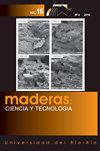应用应变计评估柠檬茅正常木材和拉伸木材的干燥应力
IF 1.5
4区 农林科学
Q3 MATERIALS SCIENCE, PAPER & WOOD
引用次数: 1
摘要
纵向干燥应变的定量评价可以为加工木材和木材工业提供相关信息,特别是关于Corymbia的反应木材,因为很少发表。本研究的目的是评估蒸汽调节和冷却对从应变计获得的纵向干燥应变(LDS)的影响,该应变计被称为伸长计,在柠檬木的正常和拉伸板中。生产30mm厚的木材,在初始温度40°C,最终温度65°C,干燥势为2,1的条件下进行干燥。测定了冷热木材蒸汽处理前后的LDS。观察到,条件没有降低LDS。热处理木材的LDS值高于冷处理木材。在正常木材、张力木材和相对木材中测量的LDS值在统计上相似,表明木材类型不是纵向干燥应力出现的影响因素。经证明,延伸仪测量LDS是可行的,可以方便、快速地定量。本文章由计算机程序翻译,如有差异,请以英文原文为准。
Application of a strain gauge to assess drying stresses in normal and tension wood of Corymbia citriodora
The quantitative evaluation of longitudinal drying strain can provide relevant information for the processing wood and lumber industry, especially with regard to reaction wood in Corymbia , since little has been published. The objective of this work was to evaluate the effect of the steam conditioning and the cooling on the longitudinal drying strain ( LDS ) obtained from a strain gauge, called extensometer, in boards of both normal and tension wood of Corymbia citriodora . Lumbers 30 mm thick were produced and kiln dried at the initial temperature of 40°C, final temperature of 65°C and drying potential of 2,1. The LDS were measured before and after steam conditioning on hot and cold lumbers. It was observed that the conditioning did not reduce the LDS . Hot lumbers showed higher LDS values than the cold lumbers. The LDS values measured in normal, tension and opposite woods were statistically similar, indicating that the type of wood was not an influential factor in the appearance of longitudinal drying stresses. Extensometer proved to be feasible for measuring LDS , allowing its easy and quick quantification.
求助全文
通过发布文献求助,成功后即可免费获取论文全文。
去求助
来源期刊

Maderas-ciencia Y Tecnologia
工程技术-材料科学:纸与木材
CiteScore
2.60
自引率
13.30%
发文量
33
审稿时长
>12 weeks
期刊介绍:
Maderas-Cienc Tecnol publishes inedits and original research articles in Spanish and English. The contributions for their publication should be unpublished and the journal is reserved all the rights of reproduction of the content of the same ones. All the articles are subjected to evaluation to the Publishing Committee or external consultants. At least two reviewers under double blind system. Previous acceptance of the Publishing Committee, summaries of thesis of Magíster and Doctorate are also published, technical opinions, revision of books and reports of congresses, related with the Science and the Technology of the Wood. The journal have not articles processing and submission charges.
 求助内容:
求助内容: 应助结果提醒方式:
应助结果提醒方式:


